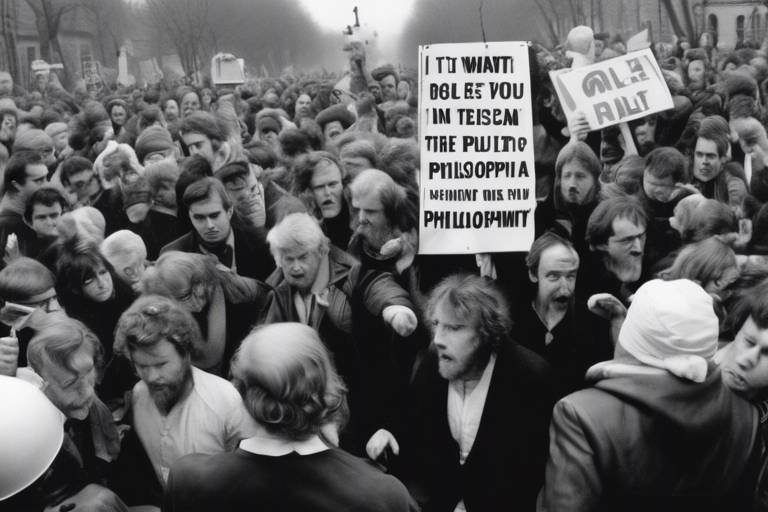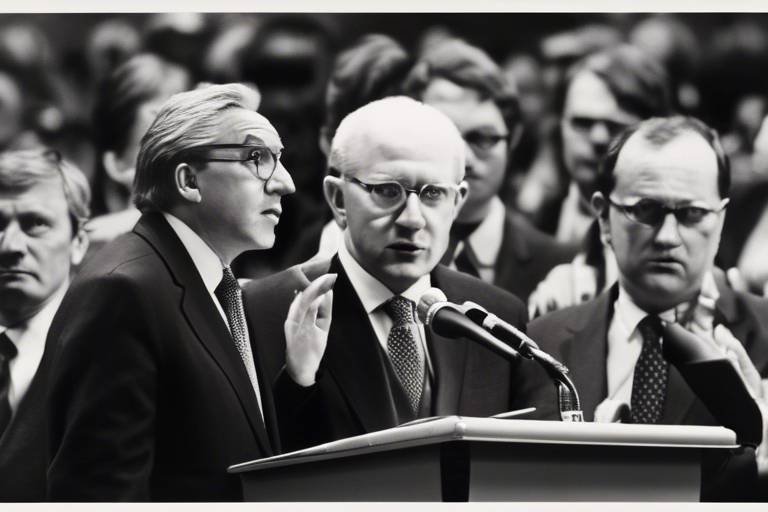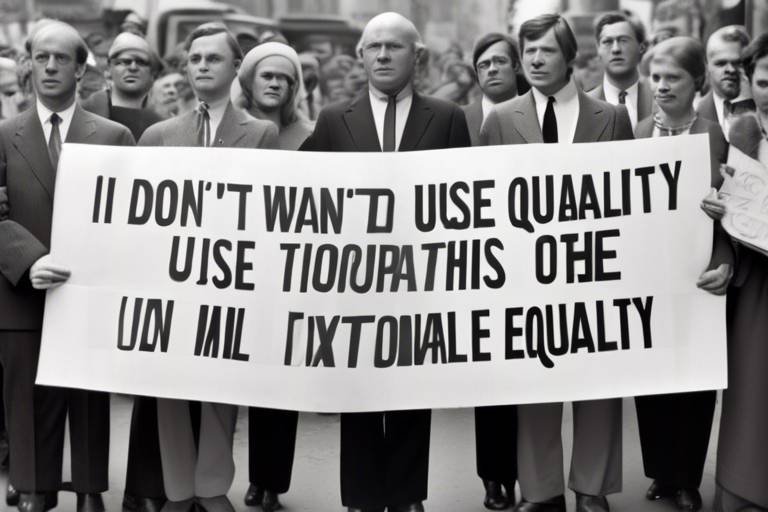The Politics of Truth in Philosophy
In a world where information is at our fingertips, the relationship between truth and politics has never been more complex or crucial. Philosophers throughout history have wrestled with the nature of truth, pondering questions that shape our understanding of society. What is truth? Is it an absolute concept, or is it shaped by our perceptions and experiences? This article dives deep into the intricate interplay of truth and politics, exploring how various philosophical thinkers have approached the concept of truth and its far-reaching implications for society. Through this exploration, we aim to uncover the layers of meaning behind political discourse and how our understanding of truth can influence governance, policy-making, and public trust.
Truth, in philosophical terms, is a multifaceted concept that has been defined and interpreted in numerous ways. At its core, truth can be seen as a reflection of reality, but the question arises: whose reality are we talking about? Various theories of truth exist, each offering a unique lens through which to examine this elusive concept. For instance, the correspondence theory posits that truth is what corresponds to reality; if a statement accurately reflects the state of affairs, it is deemed true. On the other hand, coherence theory suggests that truth is based on the coherence of a set of beliefs or propositions. These differing perspectives on truth have significant implications in political contexts, where the stakes are high, and the definitions of truth can sway public opinion and policy.
As we delve into the philosophical perspectives on truth, we encounter three dominant schools of thought: realism, relativism, and pragmatism. Each of these viewpoints offers a distinct approach to understanding truth and, consequently, shapes political ideologies in unique ways. Realism asserts that truths exist independently of our perceptions. This belief can lead to a more rigid political discourse, where facts are viewed as immutable and objective. In contrast, relativism posits that truth is subjective and context-dependent, allowing for a more fluid interpretation of political arguments. Meanwhile, pragmatism suggests that truth is not an absolute but rather a tool for solving problems, emphasizing the practical implications of truths in real-world scenarios.
Realism, with its assertion that truths exist independently of perception, has profound implications for political discourse. When politicians and policymakers align their decisions with what they claim to be objective truths, they often create policies that reflect a particular worldview. This can lead to a sense of certainty in governance, but it can also foster division when opposing factions challenge these so-called objective truths. For example, consider the debate around climate change. Realists argue that the scientific consensus on climate change is an objective truth that should guide policy decisions. However, dissenting voices often challenge this narrative, leading to political gridlock and public confusion.
Objective truths can significantly impact political policies and governance. When political leaders base their decisions on verifiable facts, they can enact reforms that address pressing societal issues. For instance, public health policies based on statistical data can lead to more effective healthcare systems. A table summarizing some examples of objective truths influencing political action could look like this:
| Issue | Objective Truth | Political Action |
|---|---|---|
| Climate Change | Rising global temperatures | International climate agreements |
| Public Health | Vaccination effectiveness | Mandatory vaccination policies |
| Economic Inequality | Wealth distribution data | Tax reforms |
Despite its strong assertions, realism faces significant critiques, particularly concerning its perceived neglect of subjective experiences. Critics argue that by focusing solely on objective truths, realism can overlook the complexities of human experience and the diverse contexts in which truths arise. This critique is especially relevant in political philosophy, where the lived experiences of individuals often challenge the notion of a singular truth. For instance, marginalized communities may have different interpretations of political truths based on their unique experiences, prompting a reevaluation of what constitutes truth in political discourse.
Relativism, with its emphasis on the subjectivity of truth, introduces a different dynamic to political thought. By positing that truth is shaped by context and perspective, relativism encourages a more inclusive approach to political arguments. This perspective can empower social movements, as it validates diverse experiences and narratives. However, it also raises questions about the potential for truth to become too malleable, leading to a situation where any claim can be justified based on personal belief. This tension between inclusivity and the risk of relativism can create challenges in political discourse, as it may blur the lines between fact and opinion.
At the intersection of truth and power lies a complex relationship where perceptions of truth can be manipulated for political gain. Authority figures often shape narratives that influence public beliefs, raising ethical questions about the responsibilities of leaders to convey the truth. In this landscape, the manipulation of truth can lead to misinformation and propaganda, undermining the very foundation of democracy.
Throughout history, political entities have engaged in the manipulation of truths to further their agendas. From propaganda during wartime to modern-day misinformation campaigns on social media, the tactics may change, but the underlying principle remains the same: control the narrative, control the populace. Understanding these tactics is crucial for citizens who seek to navigate the often murky waters of political discourse.
The ethical implications of truth-telling in politics are profound. Leaders have a responsibility to uphold honesty and transparency, as their actions can significantly impact public trust and the health of democracy. When leaders prioritize truth-telling, they foster a culture of accountability, encouraging citizens to engage in informed discussions. However, the challenge lies in balancing the need for transparency with the potential consequences of revealing uncomfortable truths. This delicate dance between truth and power is a defining characteristic of political philosophy.
- What is the relationship between truth and politics?
The relationship is complex, as perceptions of truth can influence political ideologies and governance. - How do different philosophical perspectives view truth?
Realism sees truth as objective, relativism views it as subjective, and pragmatism focuses on practical implications. - Why is truth important in political discourse?
Truth is essential for informed decision-making, public trust, and accountability in governance. - Can truth be manipulated in politics?
Yes, political entities can manipulate truths for their gain, leading to misinformation and propaganda.

The Nature of Truth
When we dive into the depths of philosophy, one of the most captivating and perplexing concepts we encounter is that of truth. But what exactly is truth? Is it a universal constant, or is it shaped by our individual experiences and perceptions? Philosophers have grappled with these questions for centuries, and their explorations have led to various definitions and theories that shape our understanding of truth in a political context.
At its core, truth can be seen as a reflection of reality, a statement that corresponds to the facts of the world. This view aligns with the idea of objective truth, which suggests that certain truths exist independent of our beliefs or perceptions. For instance, consider the statement "water boils at 100 degrees Celsius at sea level." This is a fact that holds true regardless of personal beliefs. In political discourse, such objective truths can serve as a foundation for policy-making and governance.
However, the nature of truth becomes more complex when we introduce the concept of subjectivity. Many philosophers argue that our understanding of truth is deeply influenced by our individual experiences, cultural backgrounds, and social contexts. This leads us to relativism, a perspective that posits truth as something that can vary based on different circumstances. For example, what may be considered true in one culture might not hold the same weight in another, raising questions about the universality of certain truths, especially in political debates.
In political contexts, the implications of these differing views on truth can be profound. When leaders and policymakers rely on objective truths, they can create policies grounded in reality, potentially leading to more effective governance. On the other hand, when truth is viewed through a relativistic lens, it can foster a more inclusive dialogue that respects diverse perspectives but may also lead to conflicts over competing narratives.
To further illustrate the nuances of truth, we can categorize the different theories of truth as follows:
| Theory | Description |
|---|---|
| Correspondence Theory | Truth is determined by how accurately it reflects reality. |
| Coherence Theory | Truth is a matter of the coherence of a set of beliefs or propositions. |
| Pragmatic Theory | Truth is defined by the practical outcomes of a belief or proposition. |
As we can see from the table, each theory provides a unique lens through which to view truth. The correspondence theory aligns closely with the notion of objective truths that can guide political decision-making. In contrast, the pragmatic theory suggests that truth is not static but rather evolves based on its utility in real-world applications, a perspective that can significantly influence political ideologies and social movements.
Ultimately, the nature of truth is a multifaceted concept that invites ongoing exploration and debate. As we navigate the complex interplay between truth and politics, it becomes clear that understanding these philosophical foundations is crucial for engaging meaningfully in societal discussions. The implications of our beliefs about truth can shape not only individual perspectives but also the broader political landscape, influencing everything from policy decisions to public trust.

Philosophical Perspectives on Truth
The concept of truth has been a cornerstone in philosophical discourse, influencing not only academic discussions but also the very fabric of our societal norms and political ideologies. Various philosophical perspectives offer unique lenses through which we can analyze truth, each bringing its own implications for how we understand reality and the world around us. In this exploration, we will delve into three significant perspectives: realism, relativism, and pragmatism. Each of these viewpoints has profound implications for political thought and action, shaping the narratives that govern our lives.
Realism posits that truths exist independently of human perception. Think of it as a mountain that stands tall, regardless of whether anyone is there to admire its grandeur. Realists argue that objective truths can be discovered through observation and rational inquiry, which is particularly relevant in political contexts where policies should be based on verifiable facts rather than subjective opinions. For instance, climate change is a reality supported by extensive scientific evidence. When political leaders acknowledge this objective truth, they are more likely to implement effective environmental policies that can lead to meaningful change.
On the other hand, relativism suggests that truth is not a universal constant but rather varies based on cultural, historical, or personal contexts. This perspective is akin to viewing a painting from different angles; each viewpoint provides a distinct interpretation. In political discourse, relativism can lead to a more inclusive dialogue, acknowledging that various communities may have different truths based on their experiences and backgrounds. However, this can also create challenges, as it may lead to a fragmentation of consensus, making it difficult to establish common ground on critical issues.
Pragmatism takes a more action-oriented approach, suggesting that the truth of a belief is determined by its practical consequences. Imagine a tool in a toolbox: its value is not in its design but in how effectively it accomplishes a task. In political terms, pragmatism encourages leaders to focus on solutions that work in practice rather than adhering strictly to ideological dogmas. This perspective can foster collaboration and innovation, allowing for flexible responses to complex societal challenges.
These philosophical perspectives are not mutually exclusive; rather, they often intersect and influence one another. For example, a realist might recognize the importance of relativistic viewpoints to better understand the diverse experiences of constituents. Similarly, pragmatists may utilize elements from both realism and relativism to devise effective policies that resonate with a broader audience. Understanding these perspectives helps us navigate the intricate landscape of political truth, where the stakes are high, and the implications are profound.
In summary, the philosophical perspectives on truth serve as crucial frameworks that shape our understanding of reality and influence political ideologies. By examining realism, relativism, and pragmatism, we can gain insights into how truth operates within the political sphere, guiding not only individual beliefs but also collective actions that define our societies.
- What is the main difference between realism and relativism? Realism asserts that truths exist independently of perception, while relativism argues that truth is subjective and context-dependent.
- How does pragmatism influence political decision-making? Pragmatism focuses on the practical consequences of beliefs, encouraging solutions that work in real-world scenarios rather than strict adherence to ideology.
- Can these philosophical perspectives coexist? Yes, they can intersect and inform one another, enriching our understanding of truth in politics.

Realism and Its Political Implications
Realism, in the philosophical realm, is a powerful concept that asserts the existence of objective truths independent of human perception. Imagine standing before a vast mountain range; whether you believe in its majesty or not, the mountains remain. This idea resonates deeply within political discourse, where the acknowledgment of objective truths can lead to significant implications for governance and policy-making. When politicians and leaders base their decisions on what is objectively true, they can create frameworks that are more likely to produce beneficial outcomes for society.
For instance, consider climate change. The scientific consensus presents an objective truth about rising temperatures and their consequences. When political leaders accept this truth, they are more inclined to implement policies aimed at reducing carbon emissions and promoting sustainable practices. This acceptance can lead to transformative legislation, such as the Paris Agreement, which seeks to unify nations in combating climate change. Here, realism serves as a guiding principle, directing political action toward addressing a pressing global issue.
However, the implications of realism extend beyond mere acceptance of facts. They also shape the way political discourse unfolds. Realists argue that political decisions should be grounded in empirical evidence and rationality. This perspective encourages a political climate where debates are rooted in verifiable truths rather than subjective opinions. It fosters a culture of accountability, as leaders are expected to justify their actions based on objective criteria. Such a framework can enhance public trust in governance, as citizens feel more assured that their leaders are making informed decisions rather than acting on whims or populist sentiments.
Yet, realism is not without its critiques. Detractors argue that an over-reliance on objective truths can lead to a dismissal of subjective experiences. In politics, this can manifest in a dangerous way. For example, if policymakers only consider statistical data without acknowledging the lived experiences of marginalized communities, they may inadvertently perpetuate inequalities. This critique underscores the importance of a balanced approach, where objective truths and subjective realities coexist in political deliberations.
In summary, realism plays a pivotal role in shaping political ideologies and practices. By grounding political discourse in objective truths, realism has the potential to create more effective and trustworthy governance. However, it is crucial to remain vigilant against the pitfalls of ignoring subjective experiences. The interplay between realism and political implications invites a rich discussion about how we can navigate the complexities of truth in our ever-evolving political landscape.
- What is realism in philosophy?
Realism is the belief that truths exist independently of human perception, asserting that objective realities can be known and understood. - How does realism impact political decision-making?
Realism encourages leaders to base their decisions on verifiable facts and empirical evidence, potentially leading to more effective governance. - What are the critiques of realism?
Critics argue that realism may overlook subjective experiences and the complexities of human life, which can result in policies that do not address the needs of all communities. - Can realism coexist with other philosophical perspectives?
Yes, realism can be integrated with other viewpoints, such as relativism, to create a more comprehensive understanding of truth in political contexts.

The Role of Objective Truths
When we dive into the murky waters of politics, one thing shines as a beacon of clarity: objective truths. These are the facts that exist independently of our beliefs or perceptions, like the sun rising in the east regardless of whether we acknowledge it. In the realm of political policies and governance, objective truths can serve as the bedrock upon which decisions are made. They provide a common ground that can unite diverse opinions and foster informed debates.
Consider, for instance, the issue of climate change. The scientific consensus—that human activity significantly contributes to global warming—is an objective truth that has profound implications for political action. When policymakers acknowledge this truth, it can lead to the implementation of robust environmental regulations, investment in renewable energy, and international agreements aimed at reducing carbon emissions. Conversely, ignoring or distorting this truth can result in catastrophic consequences for our planet, showcasing how objective truths can drive political agendas and shape the future of society.
Moreover, objective truths can act as a catalyst for reform. Historical movements, such as the civil rights movement in the United States, were fueled by undeniable truths about equality and justice. Activists highlighted the objective reality of systemic racism and discrimination, which ultimately compelled lawmakers to enact significant reforms. In this sense, objective truths not only inform political discourse but also empower citizens to demand accountability and change.
However, the role of objective truths in politics is not without its challenges. Politicians often face the temptation to cherry-pick facts or manipulate data to suit their agendas. This leads to a distortion of the very truths that should guide us. For example, during elections, candidates may present statistics in a misleading manner, framing objective truths to bolster their narratives while ignoring the broader context. This manipulation can erode public trust and create a landscape where misinformation thrives.
As we navigate this complex interplay between objective truths and political action, it's crucial to foster a culture of critical thinking and open dialogue. Citizens must be equipped to discern fact from fiction, holding leaders accountable for their claims. The responsibility lies not only with politicians but also with the public to demand transparency and integrity in political discourse.
In conclusion, the role of objective truths in politics is multifaceted and vital. They can drive policies, inspire movements, and shape the very fabric of society. Yet, they also require vigilance to ensure they are upheld and respected. As we continue to engage in political discussions, let us remember the importance of grounding our arguments in objective truths, fostering a healthier democracy for all.
- What are objective truths? Objective truths are facts that exist independently of personal beliefs or perceptions.
- How do objective truths influence politics? They provide a foundation for informed decision-making and can lead to significant political reforms.
- Can objective truths be manipulated? Yes, politicians may distort or cherry-pick facts to suit their agendas, which can undermine public trust.
- Why is critical thinking important in politics? Critical thinking helps citizens discern fact from fiction, ensuring that objective truths are upheld in political discourse.

Critiques of Realism
Realism, while a significant school of thought in philosophy, has faced numerous critiques that challenge its foundational premises. Critics argue that realism's assertion that truths exist independently of human perception is overly simplistic. This perspective often neglects the rich tapestry of human experience, which is inherently subjective. For instance, consider how cultural contexts shape our understanding of what is "true." A statement deemed factual in one society might be viewed as false in another, raising questions about the universality of realism.
Moreover, the rigid adherence to objective truths can lead to a dismissal of the nuanced and often complex nature of human beliefs and experiences. Critics like Friedrich Nietzsche and Michel Foucault have pointed out that power dynamics play a crucial role in shaping what is accepted as truth. They argue that what we perceive as objective truths are often constructed by societal norms and power structures, which can marginalize alternative viewpoints. This critique is particularly relevant in political discourse, where the voices of the powerful often overshadow those of the less privileged.
Another significant critique comes from the realm of epistemology, where philosophers like Thomas Kuhn have suggested that our understanding of truth is influenced by the prevailing paradigms of science and knowledge. According to Kuhn, scientific truths are not absolute but are subject to change as new discoveries are made and new theories emerge. This fluidity challenges the realist view that objective truths remain constant regardless of human interpretation.
Furthermore, the implications of realism in political philosophy can be problematic. When policymakers adopt a strictly realist approach, they may overlook the importance of public sentiment and subjective experiences. This can lead to policies that are disconnected from the realities faced by individuals, resulting in a governance style that is top-down and often authoritarian. For example, during the COVID-19 pandemic, some governments relied heavily on what they deemed objective scientific data, ignoring the lived experiences of communities affected by their decisions. This disconnection can foster distrust and resentment among the populace.
In conclusion, while realism offers valuable insights into the nature of truth, its critiques highlight the importance of considering subjective experiences and the socio-political context in which truths are constructed. Acknowledging these critiques allows for a more nuanced understanding of truth in political discourse, fostering a dialogue that respects diverse perspectives and the complexities of human experience.
- What is realism in philosophy? Realism in philosophy posits that truths exist independently of human perception, suggesting that there are objective facts that can be discovered.
- What are the main critiques of realism? Critics argue that realism overlooks subjective experiences, fails to consider the influence of power dynamics, and can lead to disconnection between policies and the lived realities of individuals.
- How does relativism differ from realism? Relativism asserts that truth is subjective and context-dependent, contrasting with realism's belief in objective truths that exist independently of human perception.
- Why is understanding truth important in politics? Understanding truth is crucial in politics as it shapes public trust, informs policy decisions, and affects the overall health of a democracy.

Relativism in Political Thought
Relativism presents a fascinating lens through which we can examine the concept of truth in political thought. At its core, relativism suggests that truth is not an absolute notion; rather, it is shaped by cultural, social, and personal contexts. This perspective challenges the idea that there is a singular truth that applies universally to all, thereby opening the door to a multitude of interpretations. Imagine walking through a gallery filled with paintings, each one telling a different story based on the viewer's experiences and emotions. Just as each observer may perceive the artwork differently, relativism posits that individuals and societies interpret truths based on their unique backgrounds.
In the realm of politics, this means that political arguments can vary dramatically depending on who is presenting them and the context in which they are made. For instance, a policy that one group views as a necessary reform might be seen by another as an infringement on rights. This divergence in perception can lead to heated debates and conflicts, as each side holds firm to their version of the truth. Political leaders often navigate these waters carefully, tailoring their messages to resonate with their specific audiences. The implications of relativism in political thought are profound, as they suggest that consensus is challenging to achieve when truths are viewed through such varied lenses.
Moreover, relativism can empower marginalized voices within political discourse. By acknowledging that different experiences shape different truths, political systems can become more inclusive, allowing for a broader range of opinions and beliefs to be represented. This inclusivity can lead to more robust and dynamic discussions around policies and governance. However, it also raises questions about the validity of certain truths, especially when they conflict with established norms or scientific evidence. How do we determine which truths deserve a platform, and which should be challenged? This is where the tension between relativism and realism becomes particularly evident.
To illustrate this point, consider the following table that outlines the key differences between relativism and realism in political thought:
| Aspect | Relativism | Realism |
|---|---|---|
| Definition | Truth is subjective and context-dependent. | Truth exists independently of perception. |
| Implications for Politics | Encourages diverse perspectives and inclusivity. | Focuses on objective truths guiding policies. |
| Conflict Resolution | Negotiation and dialogue among differing views. | Establishing common ground based on objective facts. |
| Critiques | May lead to moral ambiguity and relativism of facts. | Can overlook individual experiences and contexts. |
Ultimately, the relativist perspective in political thought invites us to reflect on our own beliefs and the influences that shape them. It challenges us to consider how our backgrounds inform our understanding of truth and how this understanding affects our political engagement. In a world where misinformation can spread like wildfire, embracing a relativistic approach can foster critical thinking and encourage us to examine the narratives presented to us. However, it is essential to balance this perspective with a commitment to factual accuracy and ethical responsibility in political discourse.
- What is relativism in political thought? Relativism in political thought is the idea that truth is subjective and influenced by cultural and social contexts, leading to diverse interpretations of political issues.
- How does relativism impact political discourse? It encourages a variety of perspectives, allowing for more inclusive discussions but can also lead to conflicts when truths clash.
- What are the critiques of relativism? Critics argue that relativism can lead to moral ambiguity and a disregard for objective facts, making it difficult to establish universally accepted truths.

The Intersection of Truth and Power
When we talk about the intersection of truth and power, we are diving into a complex web that influences not just individual beliefs but also the very fabric of society. It’s like a dance where each partner—truth and power—affects the other's steps. Have you ever noticed how certain narratives seem to dominate public discourse? This isn’t just a coincidence; it’s often a result of power dynamics that shape what we perceive as truth. In this section, we will explore how these two elements interact, the implications of their relationship, and the impact on our collective understanding.
At the heart of this relationship lies the idea that those in power often have the ability to define what is considered true. Think about it: media outlets, politicians, and even educational institutions wield significant influence over the narratives that gain traction in society. This leads to a crucial question: Who gets to decide what is true? The answer can be unsettling, as it often reveals a landscape where authority and credibility are intertwined. For instance, during political campaigns, candidates may present facts that support their agendas while dismissing opposing viewpoints as false or misleading. This selective presentation of information can skew public perception, creating a reality that aligns with the interests of those in power.
This manipulation of truth is not a new phenomenon; history is replete with examples where leaders have distorted facts to maintain control or sway public opinion. Consider the impact of propaganda during wartime. Governments often utilize carefully crafted messages to rally support, which can lead to a distorted understanding of the conflict. In such scenarios, the truth becomes a tool for manipulation rather than a guiding principle. To illustrate this, let’s take a look at a few notable examples:
| Event | Manipulated Truth | Outcome |
|---|---|---|
| World War I Propaganda | Exaggerated enemy atrocities | Increased enlistment and public support |
| Cold War Tensions | Fear of communism | Justification of military interventions |
| Modern Political Campaigns | Selective fact presentation | Polarized public opinion |
Moreover, the role of social media in amplifying these dynamics cannot be overstated. In our digital age, information spreads faster than ever, making it easier for misinformation to take root. Social media platforms can serve as echo chambers, where individuals are exposed primarily to viewpoints that reinforce their existing beliefs. This creates a feedback loop that can distort the truth even further, leading to a fragmented understanding of reality. Have you ever found yourself questioning what is true after scrolling through your feeds? It’s a common experience in today’s world.
But what about the ethical side of truth-telling? The responsibilities of those in power to present accurate information are immense. When leaders choose to manipulate truth for personal or political gain, they risk eroding public trust. This erosion can have dire consequences for democracy, as citizens become disillusioned and disengaged. The question arises: How can we hold our leaders accountable for their words? Transparency and accountability are critical in this regard. Citizens must demand honesty and integrity from their leaders while also cultivating their critical thinking skills to discern fact from fiction.
In conclusion, the intersection of truth and power is a dynamic and often troubling relationship that shapes our understanding of the world around us. As we navigate this complex landscape, it is essential to remain vigilant and question the narratives presented to us. By doing so, we not only empower ourselves but also contribute to a more informed and engaged society.
- What is the relationship between truth and power? The relationship is complex; those in power often shape the narratives that define what is considered true.
- How does misinformation affect democracy? Misinformation can erode public trust and lead to disengagement from the political process.
- What can individuals do to discern truth in media? Cultivating critical thinking skills and seeking multiple sources of information can help individuals discern fact from fiction.

Truth Manipulation in Politics
In the realm of politics, truth manipulation has become a pervasive tactic employed by various entities to sway public opinion and consolidate power. It’s almost as if the political arena has transformed into a stage where the actors—politicians, media, and even ordinary citizens—perform a carefully scripted play, often blurring the lines between fact and fiction. But why is truth so malleable in the hands of those who wield power? The answer lies in the intricate relationship between authority, narratives, and the public's perception of reality.
Consider this: when a politician makes a statement, is it merely a reflection of their beliefs, or is it a calculated move designed to resonate with a particular audience? Often, the latter is true. Political figures frequently craft their messages to align with the prevailing sentiments of their constituents, sometimes stretching the truth or outright fabricating facts. This manipulation can take many forms, including misleading statistics, cherry-picked data, and even outright lies. Such tactics can lead to a significant shift in public opinion, as seen in various historical and contemporary examples.
One notable instance of truth manipulation occurred during the 2016 U.S. Presidential Election. Misinformation spread like wildfire across social media platforms, with false narratives gaining traction and influencing voter behavior. This event serves as a stark reminder of how digital platforms can amplify manipulated truths, creating echo chambers where only certain narratives thrive. The consequences are profound, leading to a polarized society where individuals are often more inclined to believe information that aligns with their pre-existing beliefs, regardless of its factual accuracy.
Moreover, the manipulation of truth is not solely the domain of politicians; it extends to media outlets that may prioritize sensationalism over factual reporting. The rise of fake news and biased journalism has further complicated the landscape, making it increasingly challenging for the public to discern what is true. In a world where information is readily available, the question arises: how do we navigate this labyrinth of truths and half-truths?
To illustrate the impact of truth manipulation, let’s consider a few key strategies often employed:
- Selective Reporting: Highlighting specific facts while omitting others to create a skewed narrative.
- Emotional Appeals: Using emotionally charged language to elicit strong reactions, often overshadowing rational discourse.
- Repetition: Repeating falsehoods until they become accepted as truth, a tactic famously known as the “Big Lie” technique.
These strategies not only distort public understanding but also undermine the very fabric of democracy. When citizens can no longer trust the information they receive, it erodes public trust in institutions and leaders. This is particularly alarming as a well-informed electorate is crucial for a healthy democracy. Thus, the manipulation of truth in politics poses a significant threat, not just to individual beliefs but to the democratic process itself.
As we reflect on the implications of truth manipulation, it’s essential to consider the role of education and critical thinking in combating this issue. Encouraging individuals to question sources, seek diverse perspectives, and engage in open dialogue can empower them to navigate the complex terrain of political discourse more effectively. After all, in a world rife with misinformation, the ability to discern truth from manipulation is not just a skill; it’s a necessity.
- What is truth manipulation? Truth manipulation refers to the intentional distortion or misrepresentation of facts in order to influence public opinion or political outcomes.
- How can I recognize truth manipulation? Look for signs such as selective reporting, emotional language, and the repetition of certain narratives without credible evidence.
- What impact does truth manipulation have on democracy? It undermines public trust in institutions, distorts citizen understanding, and can lead to a polarized society.
- How can we combat truth manipulation? By promoting critical thinking, media literacy, and encouraging open dialogue among diverse viewpoints.

The Ethics of Truth-Telling
The ethics of truth-telling in politics is a complex and multifaceted issue that raises numerous questions about the responsibilities of leaders and the implications of their words on public trust. At its core, truth-telling is not just about relaying facts; it's about fostering a relationship of trust between politicians and the populace. When leaders choose to speak the truth, they bolster democracy and encourage civic engagement. However, when they manipulate or obscure the truth, they risk eroding the very foundations of society.
One of the most significant ethical dilemmas surrounding truth-telling is the balance between transparency and the potential consequences of revealing certain truths. For instance, should a leader disclose sensitive information that could incite panic or unrest? Is it justifiable to withhold certain facts if revealing them might compromise national security? These questions highlight the tension between ethical obligations and practical considerations.
Moreover, the impact of truth-telling extends beyond immediate political implications; it shapes the societal fabric. When politicians lie or mislead, they create a culture of skepticism, where citizens begin to question not just the words of their leaders, but also the integrity of institutions and the media. This erosion of trust can lead to widespread cynicism, disengagement from the political process, and ultimately, a weakened democracy.
To illustrate the importance of truth-telling, consider the following table that outlines the potential consequences of honesty versus dishonesty in political discourse:
| Aspect | Truth-Telling | Dishonesty |
|---|---|---|
| Public Trust | Increases trust and engagement | Erodes trust and fosters skepticism |
| Political Stability | Promotes stability and informed decision-making | Creates instability and misinformation |
| Long-term Consequences | Builds a positive legacy | Leads to potential backlash and loss of credibility |
In addition, the ethics of truth-telling also involves considering the role of the media and the public. Journalists have a responsibility to seek the truth and report it accurately, serving as a check on power. Meanwhile, the public must remain vigilant and critical of the information they consume, holding their leaders accountable for their words and actions. This reciprocal relationship is crucial for a healthy democracy.
Ultimately, the ethics of truth-telling in politics is not merely an academic discussion; it has real-world implications that affect the lives of individuals and the structure of society. As citizens, we must demand honesty from our leaders, while also recognizing the complex challenges they face. Only through a collective commitment to truth can we hope to foster a political environment that is transparent, accountable, and ultimately beneficial for all.
- Why is truth-telling important in politics? Truth-telling is vital for maintaining public trust and ensuring that citizens are well-informed to make decisions.
- What are the consequences of political dishonesty? Political dishonesty can lead to public skepticism, disengagement from the political process, and a weakened democracy.
- How can citizens hold their leaders accountable for truth-telling? Citizens can hold leaders accountable by staying informed, questioning statements, and demanding transparency through civic engagement.
Frequently Asked Questions
- What is the relationship between truth and politics?
The relationship between truth and politics is complex and multifaceted. Philosophers argue that truth can influence political ideologies, policies, and governance. When political leaders adhere to objective truths, they can make informed decisions that benefit society. However, the manipulation of truth for political gain can lead to misinformation and erosion of public trust.
- How do different philosophical perspectives on truth affect political thought?
Different philosophical perspectives, such as realism, relativism, and pragmatism, shape how we understand and engage with political discourse. Realism emphasizes objective truths, suggesting that there are facts independent of human perception, which can guide political actions. In contrast, relativism posits that truth is subjective and context-dependent, influencing how social movements and political arguments are framed.
- What are the implications of objective truths in politics?
Objective truths can significantly impact political policies and governance. For instance, scientific truths regarding climate change have led to environmental policies aimed at combating global warming. When leaders base their decisions on verifiable truths, it can result in effective governance and social reform. However, ignoring these truths can lead to disastrous consequences for society.
- What critiques exist against realism in political philosophy?
Critics of realism argue that it often overlooks the subjective experiences and interpretations of individuals. They contend that understanding truth requires acknowledging the diverse perspectives that shape human experiences. This critique is crucial because it highlights the importance of considering context and personal narratives in political discourse, which can ultimately influence policy-making.
- How does power influence perceptions of truth?
Power dynamics play a significant role in shaping perceptions of truth. Political entities often manipulate truths to maintain control or sway public opinion. This manipulation can manifest through propaganda, misinformation, and selective presentation of facts, ultimately affecting how the public perceives reality and influencing democratic processes.
- What are the ethical considerations surrounding truth-telling in politics?
The ethics of truth-telling in politics raise important questions about the responsibilities of leaders. Politicians have a duty to be transparent and honest with the public, as this fosters trust and accountability. However, the consequences of truth-telling can be complex, as revealing certain truths may lead to public panic or unrest, making the ethical implications of such actions a topic of ongoing debate.



















